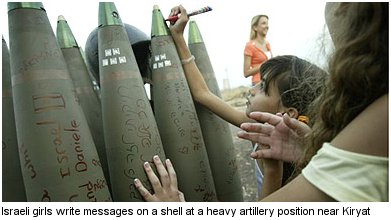Home > Israel widens attack despite UN resolution
Wars and conflicts International
Israel continued its military offensive in Lebanon today, killing at least 19 people, despite a United Nations resolution for a ceasefire, passed unanimously last night.
The deadliest attack was on homes in the village of Rachaf, in the south of the country, just four miles from the Israeli border, where at least 15 civilians were killed by air strikes, security officials said.

Israeli missiles hit a vehicle in Kharayeb, a village in the Zahrani region about halfway between Beirut and the Israeli border, killing three people and wounding five, and the army reported that a Lebanese soldier was killed overnight in an air raid near an army base in the western Bekaa Valley.
Another Israeli airstrike destroyed a road leading to the only remaining border crossing to Syria - Arida, on the northern coast - severing the last escape route for besieged Lebanese people and for humanitarian aid entering the country.
The United Nations security council unanimously approved a resolution late last night, calling for an end to the conflict in Lebanon.
The resolution demanded a "full cessation of hostilities", and authorised the deployment of up to 15,000 UN peacekeepers in southern Lebanon.
That force would stand between Israeli forces and Hizbollah as Israel withdraws completely from the south of the country and Hizbollah ceases all military activity.
The Lebanese government is hours away from voting on the ceasefire and is widely expected to accept the plan, with its prime minister, Fuad Saniora, telling reporters: "This resolution shows that the whole world stood by Lebanon."
The Israeli prime minister, Ehud Olmert, last night called George Bush to signal his agreement, and government sources say his cabinet will approve the UN resolution tomorrow but warned it may take time to implement.
Israel refused to halt air strikes until the ceasfire is approved, continuing the major ground offensive it launched yesterday.
The army announced it had nearly tripled the number of troops operating in southern Lebanon to around 30,000, with Dan Halutz, the Israeli army’s chief of staff saying: "we have multiplied by three the number of our troops operating in Lebanon".
Mr Halutz told Sky News the army will obey the ceasefire only once it is implemented and will continue to operate until Israel achieves its aims.
The army plans to move deeper into Lebanon, towards the strategically significant Litani River, some 30km (18 miles) from the Israeli border.
There were also reports that Hizbollah rockets have injured five people in northern Israel. A direct hit on a house in Amirim, a northern Israel community, injured two people who were hit by shrapnel, while a strike in the northern town of Kiryat Shemona injured three people.
The Israeli army said it had destroyed several Hizbollah rocket launchers and killed more than 40 guerrillas in the last 24 hours, although the guerrilla group disputed these figures.





Forum posts
13 August 2006, 16:35
As a frequent visitor of the English version of Ha’aretz, I have learned that its censorship will not allow any mention of Israel’s need for a new source of water. Israel now runs at a severe deficit, even though it steals water from the Palestinians and Syrians. The Litani has been a Zionist goal since day one, but Israeli authorities will not tolerate any mention of it.
Ha’aretz recently published an article stating that the Lebanon invasion has already cost israel $5.25 billion, for which the government will have to make budget cuts in other sectors of the economy. I pointed out - REPEATEDLY - in Ha’aretz’s "Talkback" feature that with $5.25 billion, Israel could have built 20 desalination plants, based on the $250 million cost of its plant in Ashkelon. But Israeli censorship will not allow my posts to see the light of day. Subsequently, Ha’aretz removed the "Talkback" feature from this article.
http://www.haaretz.com/hasen/spages/749689.html
Apparently, the Zionist regime believes it is easier and cheaper - despite the death and destruction visited on Lebanon, and its own people - to just go into Lebanon and attempt to steal the water from the Litani River. Further, it is also apparent that the regime has no patience for any discussion of the water issue.